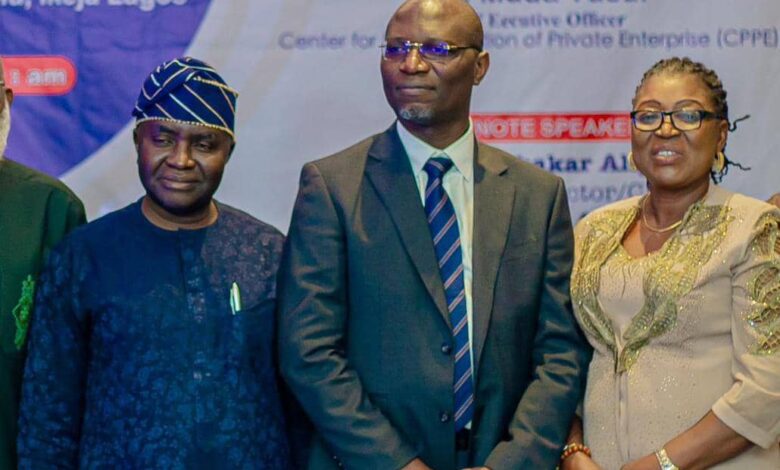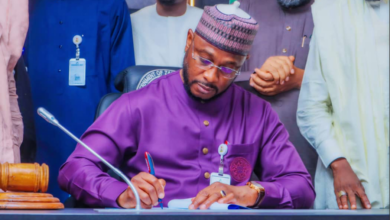Oriental News Summit 2024: Experts List Benefits of Green Economy To Nation’s Growth

L-R Dr. Muda Yusuf, CEO, CPPE, Dr. Emomotimi Agama, DG SEC and Mrs Yemisi lzuora, Publisher Oriental News Nigeria Online at the 2024 Oriental News Summit yesterday 25th July, 2024 in Lagos.
The 2024 Oriental News Summit with the theme “Green Economy, Sustainable Growth And Infrastructure Transformation,” took place yesterday at the popular Radisson Blu Hotel, Issac John Street, GRA, Ikeja.
The event attracted the who is who in Energy Industry, Government functionaries, Economic Analysts, Trade Union Associations in Energy sector, women in Sustainable Power Africa Network, and executive members of Future Energy, Renewables and Climate Action Committee.
Others who graced the occasion included members of the Governing Council of the Rural Electrification (REA), Solar Energy Experts, members of Consumer Protection Agency, Nigerian Meteorological Agency (NIMET), WIRE, PowerUp Nigeria.
The summit was chaired by a Nigerian Renowned Economist, the former Director General of Lagos Chamber of Commerce and Industry (LCCI) who is presently the Chief Executive Officer, Centre for the Promotion of Private Enterprise (CPPE), Dr Muda Yusuf; the Keynote was delivered by the Managing Director/CEO, Rural Electrification Agency (REA), Mr. Abba Abubakar Aliyu, while the Director-General of Securities and Exchange Commission (SEC), Dr. Emomotimi Agama, was the Guest Speaker who delivered the theme paper.
Also in attendance was the Director-General/CEO, Nigerian Maritime Administration and Safety Agency (NIMASA), Dr. Dayo Mobereola, students, entrepreneurs, professionals from other walks of life as well as Media Executives.
Panelists who discussed the theme of the summit “Green Economy, Sustainable Growth And Infrastructure Transformation,” were Dr. Dayo Mobereola; Mr. Abba Abubakar Aliyu; President, REEA, Prof. Magnus Onuoha; Chairman, Women in Sustainable Power African Network, Chief Mrs Anita Nana Okuribido; Director, Public Affairs and Consumer Protection, NIMET, Mrs Funke Adebayo Arowojobi; Chairperson, Women in Energy, Oil and Gas (WEOG), Mrs. Toyin Yusuf; Chairman, WIRE (An Energy Transition Programme), Prof Amina Batagarawa, and Convener/Executive Director, PowerUp Nigeria, Adetayo Adegbemie.
While the summit highlighted the imperative of embracing green economy, for sustainable growth, it also emphasized the need to improve infrastructures in the nation’s Energy sector, encouraged Public-Private partnership, available of grants/access to funding as well as advocating for appropriate policy framework in alignment with global push for promotion of green economy.
They also enumerated the imperatives of green economy to nation’s development.
Speaking on the theme paper, the Director-General of Securities and Exchange Commission (SEC), Dr. Emomotimi Agama, highlighted the benefits of embracing green economy and the requirements for implementation.
“Embracing a green economy can significantly enhance Nigeria’s sustainability development goals by reducing environmental risks, promoting social equity, and ensuring economic resilience. The shift towards a green economy will help mitigate climate change impacts, preserve biodiversity, and improve public health.
“Implementing a green economy requires comprehensive policies that promote renewable energy, sustainable agriculture, and green infrastructure. The National Climate Change Policy, Renewable Energy Master Plan and Green Bond Initiative are essential components of Nigeria’s strategy to foster sustainable development,” he explained.
He listed some of the benefits of green economy to include social and health benefits, job creation and innovation, economic diversification, and environmental sustainability.
According to him, “green economy policies can improve public health by reducing pollution and promoting cleaner technologies. According to World Health Organisation (WHO), air pollution causes an estimated 29,000 premature deaths annually in Nigeria. Additionally, sustainable practices can enhance the quality of life for communities, ensuring equitable access to resources and opportunities.
“The green economy promotes opportunities for job creation particularly in renewable energy, sustainable agriculture and green technology. The International Renewal Energy Agency (IRENA)estimates that renewable energy could create up to 52,000 direct and indirect jobs in Nigeria by 2030. This shift can stimulate innovation fostering new industries and business models that contribute to economic growth.
“Nigeria’s economy is heavily reliant on oil and gas, which accounts for over 90% of its export earnings and about 80% government revenue (World Bank 2021). Transitioning to a green economy can diversify the economic base, reducing dependence on fossil fuels and enhancing resilience against global oil price volatility.
“Nigeria faces significant environmental challenges, including deforestation, soil degradation, and water pollution. For instance, Nigeria loses about 350,000 to 400,000 hectres of forests annually (FAO, 2020). Adopting green economy practices can help mitigate these issues, promoting sustainable land use and enhancing ecosystem services.”
Earlier in her welcome address, the Publisher of Oriental News Nigeria, Mrs Yemisi Izuora explained the rationale behind the theme of the summit “Green Economy, Sustainable Growth And Infrastructure Transformation,” even as she advocated for gender equality in every action and process towards the transition to green economy.
She said the theme considers available options available for Nigeria to sustain economic development and growth.
According to her, before we arrived at this theme, we took time to appraise events, and steps taken by government countries in their drive towards accelerating green energy development which of course is linked to climate action initiatives.
She said “We understand that Nigeria is initiating policies to support sector participation in this process. However, while we support all of these initiatives, we in Oriental News Nigeria take pride in advocating gender balancing in every action and process.
“Many companies in emerging market and developing economies (EMDEs)are now prioritizing climate action and advancing gender inclusiveness as strategic way. Because we know that including women’s perspectives and talents is crucial in driving climate mitigation and adaptation as well as facilitating the transition to green energy. We have also seen how businesses in EMDEs with higher proportion of women in senior management and board are more likely to have formalized, demonstrate effective commitment when it comes to climate action and green energy transition.
“So we advocate that we approach these priorities in climate action and gender inclusion as two sides of the same coins, and double down on the value of women’s leadership in driving robust corporate actions to confront the climate crisis.
“In Nigeria, we are beginning to see some companies and government agencies promoting the gender and climate nexus
“This is true because the International Finance Corporation’s (IFC) report on ‘Gender-Responsive Climate Governance and the Role of Women Leaders’ identifies concrete actions various stakeholders, including companies can take to bring about climate benefits that tend to accrue when more women are in position of leadership,” Mrs. Izuora said.





